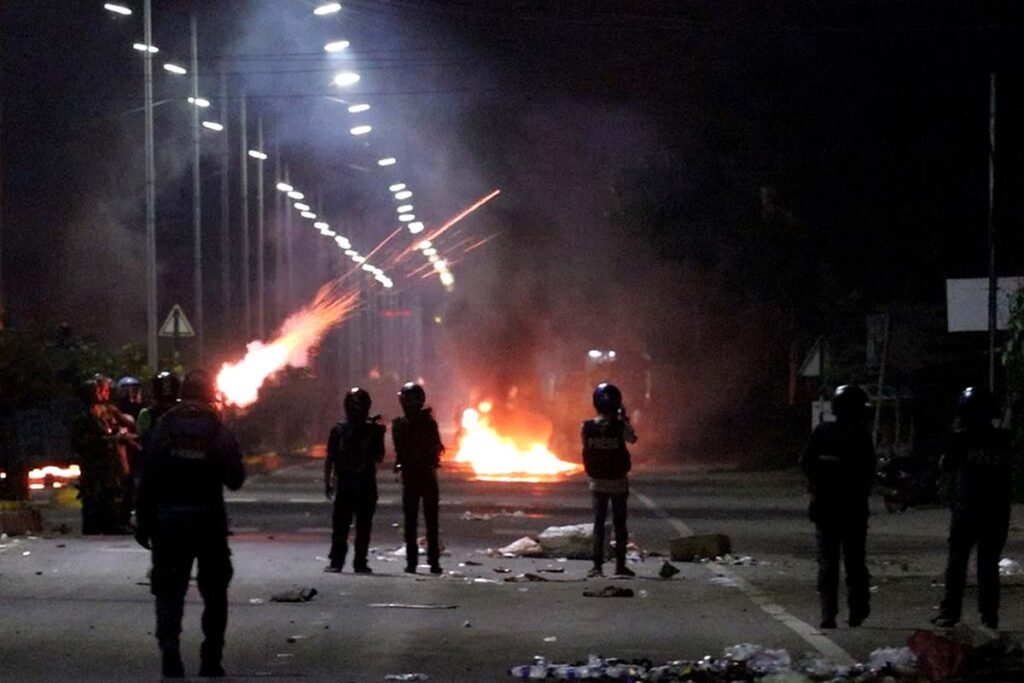Imphal, March 11, 2025 — The ongoing ethnic conflict in Manipur has taken a dangerous turn with the return of heavily armed fighters from Myanmar’s civil war. The clashes between the Meitei community and Kuki-Zo tribes, which have plagued the northeastern Indian state for over 19 months, have intensified, resulting in more than 260 deaths and the displacement of over 60,000 people — many of whom continue to live in relief camps under dire conditions.
Return of Militants from Myanmar Fuels Fresh Violence
According to official sources and security agencies, hundreds of Kuki militants, many trained and battle-hardened in Myanmar’s ongoing civil conflict, have infiltrated Manipur’s porous border. Their presence has escalated the scale and intensity of violence, bringing in sophisticated arms and guerrilla warfare tactics that are destabilizing already fragile communities.
Security experts warn that these fighters have forged new alliances with local armed groups, significantly complicating the Indian government’s efforts to restore peace in the region.
Indian Government Responds with Military Reinforcements
In response to this alarming escalation, the Indian government has deployed an additional 10,000 soldiers and paramilitary personnel to Manipur. This reinforcement follows the earlier stationing of over 50,000 security forces, making it one of the most heavily militarized areas in the country. The troops are tasked with enforcing curfews, preventing inter-communal clashes, and securing vulnerable border areas to block further infiltration.
Humanitarian Crisis and Ethnic Segregation
The ongoing violence has led to the creation of ethnically segregated zones, where Kuki-Zo and Meitei communities remain divided. Thousands of displaced families are now living in overcrowded relief camps, lacking adequate access to food, clean water, medical aid, and education for children. Relief agencies report heightened malnutrition and mental health issues among camp residents as violence shows no sign of subsiding.
Background of the Conflict
The Manipur ethnic conflict began in May 2023 when protests against the Meitei community’s demand for Scheduled Tribe (ST) status turned violent. What began as a clash over affirmative action policies soon spiraled into widespread ethnic violence, leading to the burning of homes, churches, and temples and mass displacements.
The Kuki tribes allege systematic discrimination and targeted attacks, while the Meitei community accuses Kuki armed groups of violent insurgency and illegal immigration from Myanmar.
International Concerns and Calls for Peace
The international community, including human rights organizations, has expressed deep concern over the deteriorating situation in Manipur. Several bodies have urged dialogue, reconciliation efforts, and immediate humanitarian assistance to prevent further loss of life and to rebuild trust between the warring communities.
Political Reactions and Government’s Assurance
Manipur’s Chief Minister N. Biren Singh recently apologized to citizens for the ongoing unrest and assured them that the government is committed to restoring peace and normalcy.
“The violence must end. We are working tirelessly to ensure security and dialogue to address grievances from both communities,” said a senior official from the Manipur government.
However, civil society leaders and activists continue to demand a more transparent investigation into human rights violations and stronger peace-building initiatives.
Conclusion:
As Manipur continues to grapple with one of the worst ethnic conflicts in recent Indian history, urgent action is needed to address humanitarian needs, foster reconciliation, and secure long-term peace. The return of Myanmar-trained militants has further complicated the situation, raising the stakes for both the state and central governments in ensuring stability and justice for affected communities.

